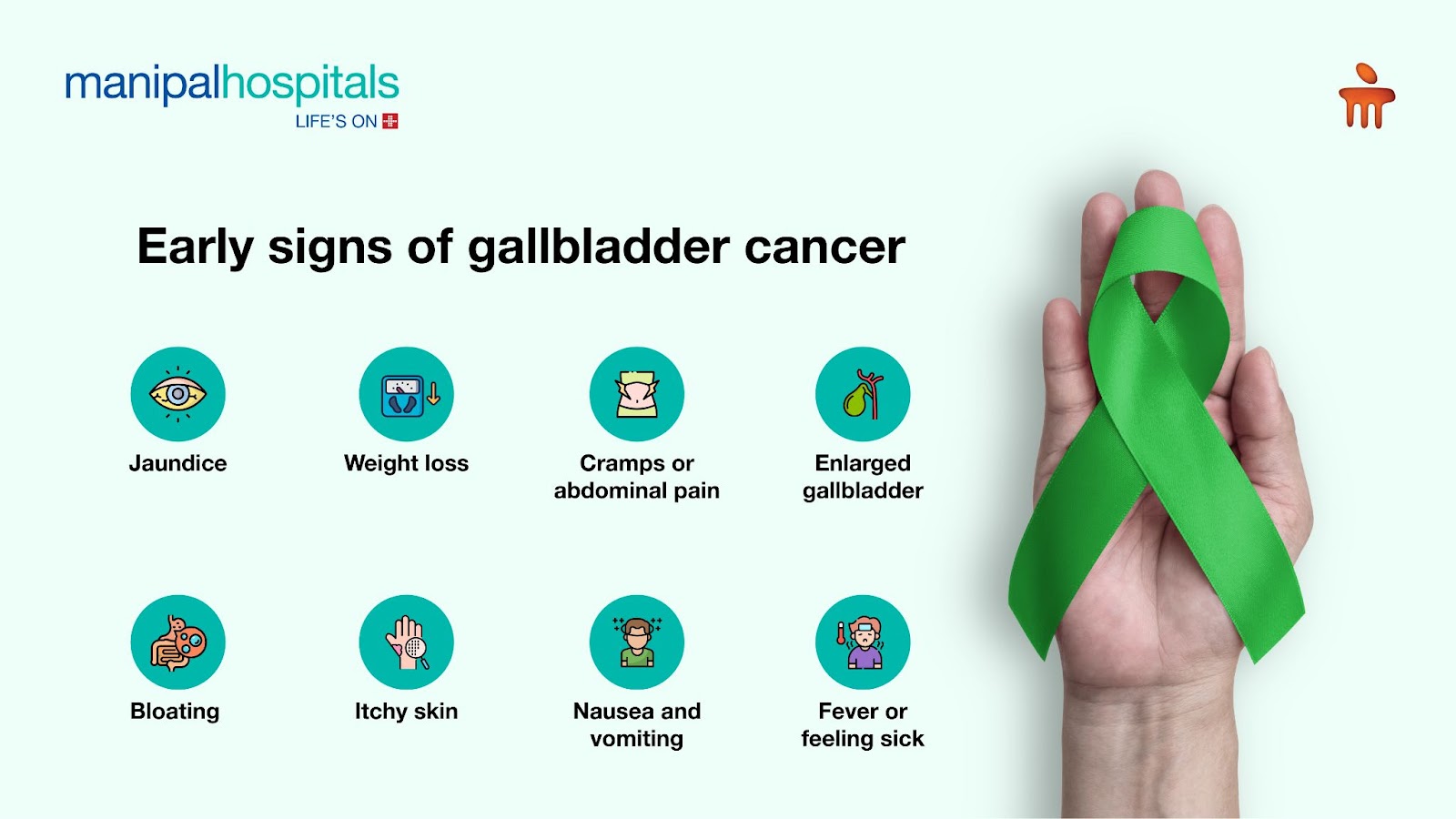Gallbladder cancer is a rare but highly lethal cancer originating in the gallbladder. Out of 115,949 people diagnosed with gallbladder cancer, 84,695 died worldwide in 20201. India follows the same trend, contributing to almost 10% of the global cases. It affects women more than men2. The detection of gallbladder cancer in its early stages is quite challenging, as its symptoms don't show up easily. However, to increase survival rates, let's understand the early signs, risk factors, diagnostic tests, and procedures used to stage gallbladder cancer.
Synopsis
About Gallbladder Cancer
Gallbladder cancer originates when the cells in the gallbladder start growing and divide uncontrollably. The gallbladder is a small, pear-shaped organ located beneath the liver, serving the role of bile storage. People with gallstones, cholecystitis (chronic inflammation of the gallbladder), and older age are at a higher risk of developing this cancer. It starts from the inner layers, spreads to the outer layers, and then to other body parts, making its treatment challenging. Early diagnosis and timely treatment are the keys to achieving better patient outcomes.
Early Signs of Gallbladder Cancer

The signs of gall bladder cancer in its early stages usually go unnoticed and are often confused with other conditions. Recognising these early signs of gallbladder cancer can be challenging, but it can help in early intervention. When seen, its symptoms include:
- Jaundice
- Weight loss
- Cramps or abdominal pain
- Enlarged gallbladder
- Bloating
- Itchy skin
- Nausea and vomiting
- Fever or feeling sick
- Lumps in the abdomen
If you experience persistent or worsening symptoms that don't improve with medication, it's important to seek medical evaluation by an expert doctor immediately.
Causes of Gallbladder Cancer
The exact cause of gallbladder cancer is not well understood, but certain risk factors may increase the likelihood of developing the disease. These include:
- Gallstones
- Cholecystitis (chronic inflammation of the gallbladder)
- Family history
- Obesity
- Ageing
- Sex and ethnicity
- Gallbladder polyps
- Porcelain gallbladder (buildup of calcium deposits on the gallbladder wall)
- Choledochal cysts
Knowing these risk factors is essential for timely diagnosis and treatment. If you have an increased risk of developing this cancer, make sure to undergo a regular assessment by a doctor.
Stages of Gallbladder Cancer
To know the extent to which cancer has spread in your body, it's assessed by the number and gallbladder cancer stages, including:
1. Stage 0: The cancer cells are confined to the innermost layer of the gallbladder lining, also called carcinoma in situ.
2. Stage I: The cancer is confined to the gallbladder wall.
3. Stage II: The cancer has spread beyond the gallbladder wall to nearby layers of connective tissue.
4. Stage III: The cancer has spread to the liver, lymph nodes, or nearby organs.
5. Stage IV: In this stage, cancer has spread to distant organs or tissues and reaches the blood vessels.
If the cancer is diagnosed and treated in stage I, it's generally curable, though stages II-IV are challenging to treat.
Gallbladder Cancer Diagnosis
Gallbladder cancer mostly gets diagnosed when you visit the doctor for gallbladder stone treatment or other similar diseases. Also, it can be noticed during the assessment of nearby organs. Its diagnosis includes blood tests, liver function tests, and imaging tests (Ultrasound, MRI, and CT scans).
Determining the Gallbladder Cancer Stage
After its diagnosis, the next step is to determine its extent, i.e., its stage. Knowing this helps in determining the appropriate treatment option. For stage I, the treatment focuses on removing the cancer, whereas for other stages, the aim is to extend the life by managing the symptoms.
Common tests and procedures used for staging gallbladder cancer:
- Imaging studies: CT scan, MRI, Positron Emission Tomography (PET) Scan
- Endoscopic Ultrasound
- Laparoscopy
- Surgical Biopsy (Exploratory Laparotomy)
- Lymph Node Biopsy
- Liver Function Tests
- CA 19-9 and CEA tumor marker identification
- Pathological evaluation
Gallbladder Cancer Treatment
After assessing the cancer’s stage, your oncologist will recommend a tailored treatment plan that suits your needs, including:
- Surgery - Cholecystectomy
- Chemotherapy
- Radiation Therapy
- Targeted Therapy
- Immunotherapy
- Radio Sensitizers
- Palliative care
Gallbladder cancer is highly lethal. Thus, it is important to recognise at an early stage for improved treatment outcomes and quality of life. Understanding the early signs, risk factors, and stages of gallbladder cancer can empower individuals to seek timely medical attention and explore appropriate treatment options. If you have concerns about gallbladder health or experience persistent symptoms, schedule a consultation with our oncologist at Manipal Hospitals, Mukundapur, Kolkata.
FAQ's
Unlike other cancers, specific inherited genetic mutations do not play an important role in developing gallbladder cancer. But if you have a strong family history of gallbladder cancer, you can benefit from genetic counselling, as it helps in assessing your potential risk.
Currently, there are no routine screening tests for gallbladder cancer to detect it at an early stage. It is often diagnosed incidentally during imaging studies performed to assess other conditions or when symptoms related to the gallbladder persist. If you are at increased risk, get regular checkups done by an oncologist.
The development of gallbladder cancer can also lead to various other potential complications, such as:
- Obstruction of the bile ducts
- Jaundice
- Infections
- Spread of cancer to nearby organs
To prevent it from spreading to other body parts, get early detection and treatment by scheduling a regular checkup with our specialists.
Gallbladder cancer cannot always be prevented, but making certain changes in your lifestyle can reduce its risk. It includes maintaining a healthy weight, eating a balanced diet, managing gallstones, and other conditions that increase its risk of developing.
To schedule an appointment at Manipal Hospitals, contact our Oncology department or visit our website.





















 4 Min Read
4 Min Read













